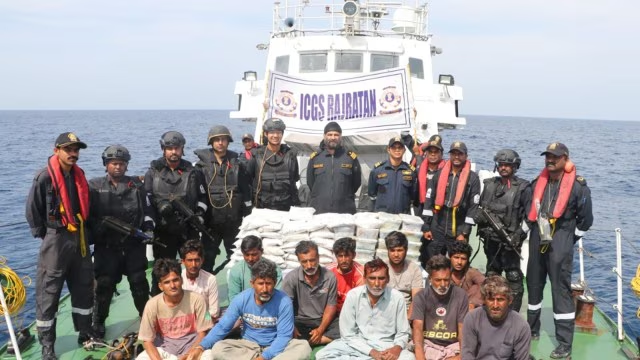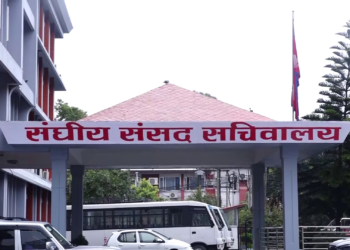Sri Lanka is facing an alarming influx of drugs from Pakistan, facilitated by sophisticated international drug trafficking networks.
This deluge of narcotics is wreaking havoc on Sri Lankan society, fueling addiction, crime, and social instability.
The scale of the drug problem is staggering. Just recently, Sri Lankan authorities arrested a Pakistani woman smuggling over 2.5 kg of heroin worth Rs. 73.5 million into the country.
In another major bust last year, 9 Pakistani traffickers were sentenced to 10 years for attempting to traffic a staggering 614 kg of crystal meth and 581 kg of other drugs by boat.
The Indian Coast Guard intercepted a Pakistani vessel carrying 86 kg of heroin worth over $80 million destined for Sri Lanka. These are just a few examples.
The drugs are sourced from Afghanistan and smuggled via sea routes known as the “hash highways” that originate from Pakistan’s Makran coast.
Over $900 million worth of drugs have been seized in the Indian Ocean in the last two years alone by international naval forces patrolling these narco-trafficking corridors.
But this is likely just the tip of the iceberg given the sheer scale of the illicit operations.
International investigative reports have mapped the underworld of military-intelligence patronage of drug lords and cartels stretching from Afghanistan across the Indian Ocean region into Africa and Europe over decades.
Four Sri Lankan ISIS operatives recently arrested in India were found involved in drug trafficking linked to a Pakistani handler.
Major drug busts have occurred on Sri Lankan and Maldivian boats destined for Australia and Southeast Asia.
Indian agencies regularly interdict Pakistani drug vessels carrying arms and narcotics worth hundreds of millions along both coastlines.
As Sri Lanka confronts the toxic blowback, the international community needs to enhance multi-lateral initiatives to dismantle this drug machinery and its global subsidiaries.
This web of narco-crime poses an existential security threat to Sri Lanka.
The influx of cheap drugs is fueling addiction and despair, particularly among Sri Lanka’s youth.
Criminal syndicates profiting from the drug trade are souring the economy and society with illicit financial flows.
There are fears that portions of drug profits may even be diverted to fund extremist elements and terror networks undermining the nation’s security.
Moreover, endemic corruption enables the drug cartels to penetrate law enforcement, government institutions, and the political system – holding the state hostage and crippling Sri Lanka’s social and economic development.
With the country already reeling from economic crisis, the drug scourge threatens to be the spark that ignites a vicious cycle of instability and unrest endangering Sri Lanka’s future.
For decades, the these drug traders have cultivated alliances with Afghan drug lords and international criminal syndicates – using narco-proceeds to finance terrorist proxies causing mayhem across South Asia while also padding the coffers of the military’s corporate empires.
Pakistan has long been telling the international community about cooperating on counter-narcotics while simultaneously serving as the global logistics hub for the drug trade.
Even as Pakistani naval vessels notionally participated in US-led maritime security operations, Pakistani drug dhows plied the high seas unhindered from Makran carrying narcotics cargo worldwide.
Revelations continue to surface on how Pakistan’s intelligence agency has micro-managed narco empires stretching into Africa to fund global jihadi outfits.
This sordid underbelly includes working with terrorist proxies and money laundering networks to disrupt regional security while shielding organized criminal leadership under state patronage.
For its part, Sri Lanka must prioritize shutting down the drug pipeline through enhanced legislation, capacity building of law enforcement agencies, and forging international security partnerships based on mutual legal assistance.
Pakistan has been seeking FATF redemption while concomitantly acting as the world’s biggest ‘Narco-terror’ hub.
No amount of empty reassurances or superficial actions can camouflage the reality that Pakistan remains the epi-center globalizing the drug trade and weaponizing narco-terrorism as a tool of statecraft.
As Sri Lanka confronts the toxic blowback, the international community needs to enhance multi-lateral initiatives to dismantle this drug machinery and its global subsidiaries.
The UN and collective security forums like FATF must intensify scrutiny and accountability for Pakistani state complicity with drug kingpins, criminal networks, and terror operatives exploiting narco-turf.
Both China and the United States – despite their geo-political rivalry – have converging interests in cracking down on Pakistani-origin drug networks that are destabilizing regional security.
As a major creditor, Beijing should cease writing blank checks to Pakistan and instead exercise leverage to compel the Pakistani military to cut links with drug mafias and terror proxies.
For its part, Sri Lanka must prioritize shutting down the drug pipeline through enhanced legislation, capacity building of law enforcement agencies, and forging international security partnerships based on mutual legal assistance.
A whole-of-society approach harnessing community participation is needed to wage a multi-front war against the drug menace.
Unless the country is made to pay an exorbitant price and held accountable on the world stage, the drug onslaught will persist – potentially consuming Sri Lanka in a vicious cycle of narco-anarchy and wreaking untold damage to societal and human capital.
Mustering the courage and moral resolve to confront this narco-terrorism head on is imperative not just for Sri Lanka’s stability and future, but for regional and global security.









Comment